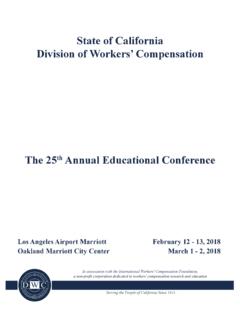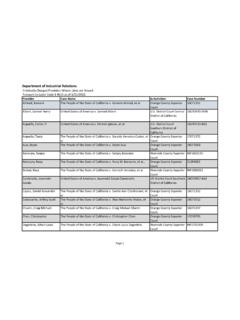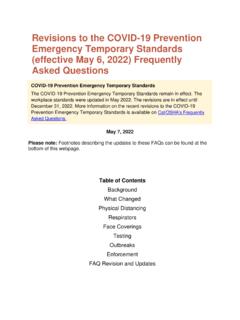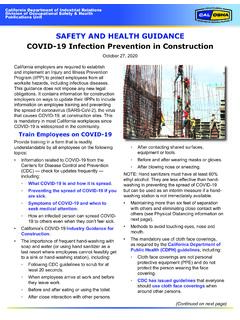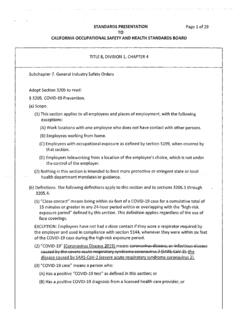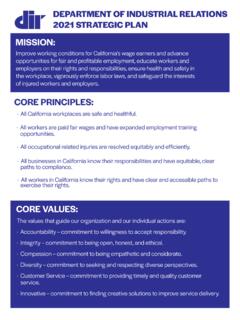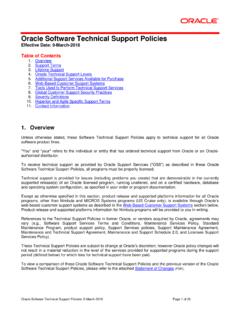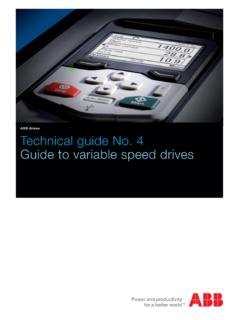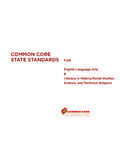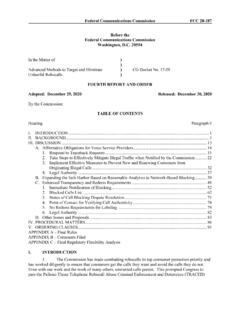Transcription of PROFESSIONAL, TECHNICAL, CLERICAL, MECHANICAL AND …
1 OFFICIAL NOTICE INDUSTRIAL WELFARE COMMISSION order NO. 4-2001 REGULATING WAGES, HOURS AND WORKING CONDITIONS IN THE PROFESSIONAL, technical , CLERICAL, MECHANICAL AND SIMILAR OCCUPATIONS Effective January 1, 2002 as amended Sections 4(A) and 10(C) amended and republished by the Department of Industrial Relations, effective January 1, 2019, pursuant to SB 13, Chapter 4, Statutes of 2016 and section of the Labor Code This order Must Be Posted Where Employees Can Read It Easily IWC FORM 1104 (Rev. 11/2018) OSP 06 98762
2 Please Post With This Side Showing OFFICIAL NOTICE Effective January 1, 2001 as amended Sections 4(A) and 10(C) amended and republished by the Department of Industrial Relations, effective January 1, 2019, pursuant to SB 3, Chapter 4, Statutes of 2016 and section of the Labor Code INDUSTRIAL WELFARE COMMISSION order NO.
3 4-2001 REGULATING WAGES, HOURS AND WORKING CONDITIONS IN THE PROFESSIONAL, technical , CLERICAL, MECHANICAL AND SIMILAR OCCUPATIONS TAKE NOTICE: To employers and representatives of persons working in industries and occupations in the State of California: The Department of Industrial Relations amends and republishes the minimum wage and meals and lodging credits in the Industrial Welfare Commission s Orders as a result of legislation enacted (SB 3, Ch. 4, Stats of 2016, amending section of the California Labor Code), and pursuant to section of the California Labor Code. The amendments and republishing make no other changes to the IWC s Orders.
4 1. APPLICABILITY OF order This order shall apply to all persons employed in professional, technical , clerical, MECHANICAL , and similar occupations whether paid on a time, piece rate, commission, or other basis, except that: (A) Provisions of Sections 3 through 12 shall not apply to persons employed in administrative, executive, or professional capacities. The f ollowing requirements shall apply in determining whether an employee s duties meet the test to qualify for an exemption from those sections: (1) Executive Exemption. A person employed in an executive capacity means any employee: (a) Whose duties and responsibilities involve the management of the enterprise in which he/she is employed or of a customarily recognized department or subdivision thereof; and (b) Who customarily and regularly directs the work of two or more other employees therein; and (c) Who has the authority to hire or fire other employees or whose suggestions and recommendations as to the hiring or firing and as to the advancement and promotion or any other change of status of other employees will be gi ven particular weight.
5 And (d) Who customarily and regularly exercises discretion and independent judgment; and (e) Who is primarily engaged in duties which meet the test of the exemption. The activities constituting exempt work and non-exempt work shall be construed in the same manner as such items are construed in the following regulations under the Fair Labor Standards Act effective as of the date of this order : 29 Sections , , and Exempt work shall include, for example, all work that is directly and closely related to exempt work and work which is properly view ed as a means for carrying out exempt functions. The work actually performed by the employee during the course of the workweek must, first and foremost, be examined and the amount of time the employee spends on such work, together with the employer s realistic expectations and the realistic requirements of the job, shall be considered in determining whether the employee satisfies this requirement.
6 (f) Such an employee must also earn a monthly salary equivalent to no less than two (2) times the state minimum wage for full-time employment. Full-time employment is defined in Labor Code Section 515(c) as 40 hours per week. (2) Administrative Exemption. A person employed in an administrative capacity means any employee: (a) Whose duties and responsibilities involve either: (i) The performance of office or non-manual work directly related to management policies or general business operations of his/her employer or his/her employer s customers; or (ii) The performance of functions in the administration of a school system, or educational establishment or institution, or of a department or subdivision thereof, in work directly related to the academic instruction or training carried on therein; and (b) Who customarily and regularly exercises discretion and independent judgment.
7 And (c) Who regularly and directly assists a proprietor, or an employee employed in a bona fide executive or administrative capacity (as such terms are defined for purposes of this section); or (d) Who perfor ms under only general supervision work along specialized or technical lines requiring special training, experience, or knowledge; or (e) Who executes under only general supervision special assignments and tasks; and (f) Who is primarily engaged in duties that meet the test of the exemption. The activities constituting exempt work and non-exempt work shall be construed in the same manner as such terms are construed in the following regulations under the Fair Labor Standards Act effectiveas of the dateof this order :29 , , , and Exempt work shall include, for example, all work that is directly and closely related to exempt work and work which is properly view ed as a means for carrying out exempt functions.
8 The work actually performed by the employee during the course of the workweek must, first and foremost, be examined and the amount of time the employee spends on such work, together with the employer s realistic expectations and the realistic requirements of the job, shall be considered in determining whether the employee satisfies this requirement. (g) Such employee must also earn a monthly salary equivalent to no less than two (2) times the state minimum wage for full-time employment. Full-time employment is defined in Labor Code Section 515(c) as 40 hours per week. (3) Professional Exemption. A person employed in a professional capacity means any employee who meets all of the following requirements.
9 1
10 (a) Who is licensed or certified by the State of California and is primarily engaged in the practice of one of the following recognized professions: law, medicine, dentistry, optometry, architecture, engineering, teaching, or accounting; or (b) Who is primarily engaged in an occupation commonly recognized as a learned or artistic profession.


